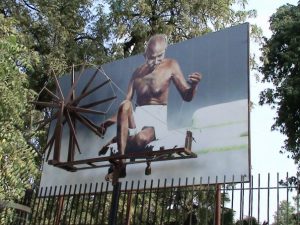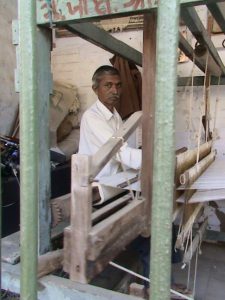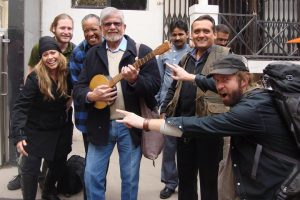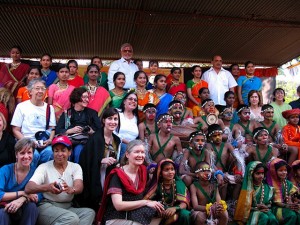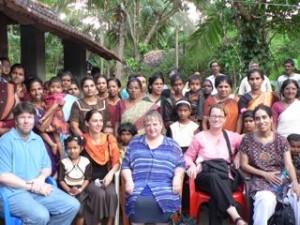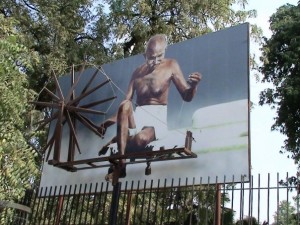
Gandhi and spinning wheel, Gandhian Legacy Tour by Malia Everette
Lately Mahatma Gandhi’s philosophy of nonviolence, of forceful truth and love, known as Satyagraha, has occupied my heart and mind.
As many of us here at Global Exchange witness and support the nonviolent direct action protests in the US and around the world, from Occupy Wall Street to the Tar Sands Movement taking on the Keystone XL pipeline, I remember the living philosophical teachings of Gandhi as shared and taught by his grandson Dr. Arun Gandhi during the Gandhian Legacy Reality Tour I was so blessed to join in 1999 and 2009.
Dr.Arun Gandhi, the grandson of Mahatma Gandhi, leads our annual co-sponsored delegation with the assistance of his son Tushar Gandhi. For 14 years now this tour has retraced the footsteps of the Independence movement and also highlighted Gandhi’s philosophies thriving in diverse organizations, rural development agencies, women’s cooperatives, non-governmental organizations and Fair Trade cooperatives across India.As Arun mentions, nonviolence is a lifestyle, and an active one!
Here is more from Arun Gandhi about his grandfather’s philosophy:
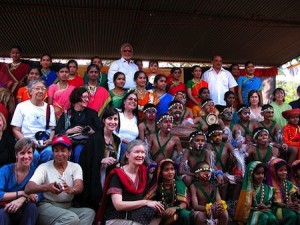
The Gandhian Legacy Reality Tour 2009 by Garth Dyke
Mohandas K. Gandhi’s philosophy of nonviolence is like the iceberg — what is visible is only a fraction of what is hidden. Scholars have analyzed over and over the part that deals with political conflicts and independence of nations, because they insist that nonviolence is simply a strategy of convenience.
Gandhi said: This philosophy is not like a jacket that you wear when necessary and discard when not. Nonviolence is a life style that one has to adopt which means allowing all the love, understanding, respect, compassion, acceptance and appreciation to emerge and dominate one’s attitude. Then we will be able to build good relationships not only within the family but outside of the family. We will no longer be selfish and greedy but magnanimous and giving.
It is no longer a secret that official India had abandoned Gandhi’s philosophy upon gaining independence. However, there are many at the grassroots level, young and old, who are still inspired by his philosophy and have put it into action to bring about a qualitative change in the Indian society. Many have started projects to bring solace to the poor of whom there are more than 500 million in India.
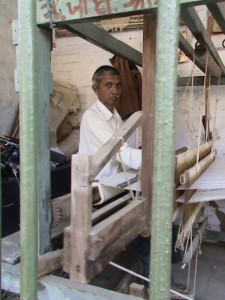
Man Weaving Cotton, Gandhian Legacy Tour by Malia Everette
The Gandhi Legacy Tour explores these projects in the cities and in the villages to see first hand how people have used Gandhi’s philosophy in every day life. How they are trying to deal with conflict situations constructively. It is an unusual tour in as much as we visit places where normal tourists do not go, we are hosted by the poor in city slums and in traditional India. Among the many diversities in India the one that divides the westernised urban India and the traditional rural India is the most odious. Urban India is not India at all and we shall explore this on the tour, while the traditional India is the true heart of India. The experience of traveling with the Gandhi Family is both educative and enjoyable. Come and experience it for yourself.
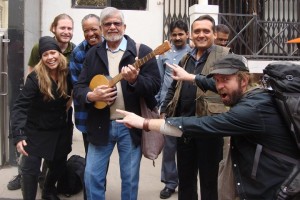
Singing A Round with Dr. Arun Gandhi, the Gandhian Legacy Tour 2009
Passive resistance and compassion are perhaps some of the easy takeaways from Gandhi’s Legacy. When I returned from the Gandhian Legacy Reality Tour in 2009 I made a personal commitment to trusteeship. We each have a talent that we have acquired or inherited. We can use this to achieve our goals, our personal ambitions, and we can use it to be in service to others. I’ve made personal and professional changes in my life because of Satyagraha. Reflecting on the resurgence of social movements I am reminded by other tenants of Gandhi’s philosophy: self reliance and self sufficiency; political and economic decentralization; the minimization of competition and exploitation in society and economy and the enhancement of cooperation; respect for labor and rural life; production based on need and not just profit maximization; and a deep respect for the natural environment.
Take Action! If you need to break away from your day to day, reflect, learn and (re)engage then join Dr. Gandhi on this Gandhian Legacy Reality Tour or consider how Satyagraha might inspire you in 2012.

